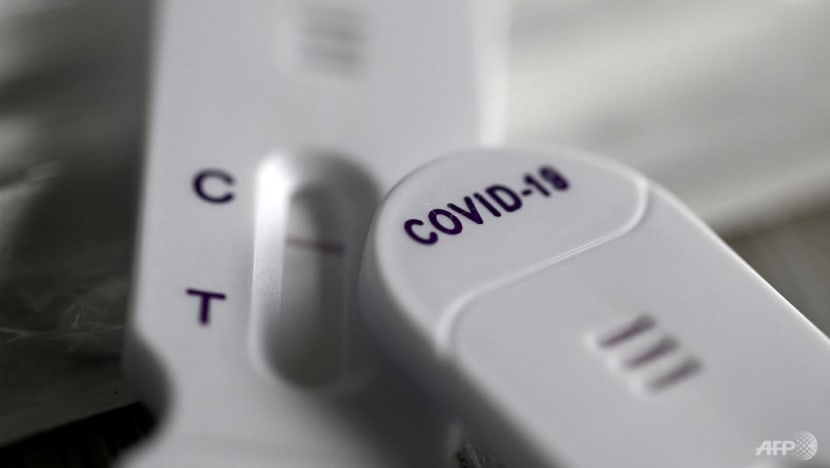Explainer: What are the BA.4 and BA.5 Omicron variants and can Singapore expect a new COVID-19 wave?

File photo of a COVID-19 ART self-test. (File photo: AFP/Damien Meyer)
SINGAPORE: The discovery of Omicron subvariants in Singapore is to be expected, said health experts, after the country on Sunday (May 15) reported its first three community cases with the BA.4 and BA.5 variant.
The Ministry of Health (MOH) said it will step up surveillance efforts and continue monitoring the spread of BA.4 and BA.5 in Singapore.
"While our society is now more resilient against the virus, everyone should continue to play their part and remain vigilant to mitigate the spread of COVID-19," it added.
Just how infectious are the new subvariants and should people be concerned? Here's what we know so far.
Q: What are the BA.4 and BA.5 subvariants?
First identified in South Africa earlier this year, the BA.4 and BA.5 variants have since become the dominant strains there. They are often discussed together because the mutations in their spike protein gene are identical, said a report on VaccinesWork, a platform hosted by Gavi.
According to South African scientists, the variants can dodge antibodies from earlier infection but are far less able to thrive in the blood of people vaccinated against COVID-19.
Singapore's Health Ministry said the two variants contain mutations in the spike protein which appear to confer "greater immune escape properties and higher transmissibility" compared to the BA.1 and BA.2 variants, which caused the Omicron surge in the country earlier this year.
Q: How transmissible are they?
South Africa is currently seeing a surge of new COVID-19 cases driven by the two subvariants, with numbers jumping from an average of 300 per day in early April to about 8,000 per day this week.
Globally, at least 1,000 cases of BA.4 and BA.5 have been reported in at least 16 countries as of May 11, according to the World Health Organization (WHO).
But knowledge of the variants remains limited, with the WHO adding them to its list for monitoring earlier last month.
Based on "neutralisation escape", BA.4 and BA.5 have the potential to result in a new infection wave, a South African study said.
However, there is so far no indication that BA.4 or BA.5 are associated with new symptoms or more severe disease.
"It is still early for this subvariant but so far we are not sensing more cases of severe disease," Professor Dale Fisher, senior consultant at National University Hospital's division of infectious diseases, told CNA.
Q: Are we likely to see a wave of new cases?
Singapore should expect future waves of COVID-19, said Associate Professor Alex Cook, vice dean of research at the National University of Singapore’s Saw Swee Hock School of Public Health.
But the emergence of new variants is not the only factor.
"We should expect future waves of COVID in Singapore, and these are likely to be due to either falling immunity, as protection against infection wanes over time, or to the mutation of the virus to be further from the one that many of the members of the population have immunity to," he explained.
"For future COVID waves, we expect that even when immunity to infection with the dominant virus falls, the protection against severe disease should fall by less, and the health system should not be threatened as much."
It is possible that the subvariants could lead to an increase in cases, said Prof Fisher.
"We are seeing some escape from immunity which gives these emerging subvariants a growth advantage," he noted. "But we don’t expect to see more frequent severe disease. This reflects the overseas experience."
In the case of South Africa, there has been no increase in severe cases and deaths, according to Professor Marta Nunes, a researcher at Chris Hani Baragwanath Hospital in Soweto who spoke to the Associated Press.
Q: Will COVID-19 restrictions need to be reimposed?
Discovering subvariants in Singapore is to be expected, said Assoc Prof Cook, adding that people should not be alarmed.
"New subvariants will continue to be found and eventually will lead to new waves, but this should not provoke undue alarm," he said, adding that "socially disruptive measures" may only be needed if the healthcare system here is in jeopardy.
"Reimposition of pandemic-era measures would be needed only if it looks like severe cases will exceed the healthcare system’s capacity to absorb them," he said.
Prof Fisher added that it is natural for variants to emerge.
"So it's about monitoring the virus as it changes genetically and observing the clinical impact. Only then can we act with an appropriate response," he said.
On whether further COVID-19 vaccine shots would be needed to combat variants, Prof Fisher said he believes additional boosters will not be needed to counter an increase in mild cases.
He noted, though, that booster jabs may be recommended should there be more hospitalisations and severe cases among certain groups such as the elderly.
The three subvariant cases reported in Singapore have not required hospitalisation, and had either been asymptomatic or had mild symptoms such as fever, cough, runny nose and sore throat.
All three are fully vaccinated and received their booster dose, said MOH on Sunday.
BOOKMARK THIS: Our comprehensive coverage of the COVID-19 pandemic and its developments
Download our app or subscribe to our Telegram channel for the latest updates on the coronavirus pandemic: https://cna.asia/telegram

















